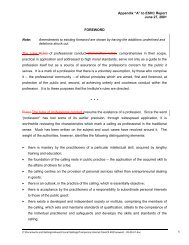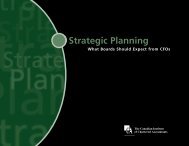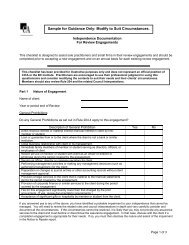CICA 20 QUESTIONS Strategy - Institute of Chartered Accountants ...
CICA 20 QUESTIONS Strategy - Institute of Chartered Accountants ...
CICA 20 QUESTIONS Strategy - Institute of Chartered Accountants ...
- No tags were found...
Create successful ePaper yourself
Turn your PDF publications into a flip-book with our unique Google optimized e-Paper software.
With respect to ‘insight’, directors are there to add their experiencesand wisdom, not to second-guess management, but to supplement andenhance executive decision-making.As for ‘foresight’, the directors arethere to provide a perspective on the future that helps managementidentify those opportunities that are most worth pursing.Notwithstanding these traditional functions, the role <strong>of</strong> the Board <strong>of</strong>Directors is now changing (largely to compensate for recently identifieddeficiencies in Board corporate governance).This new role requiresdirectors to be much more active participants in the ‘high-level’ affairs<strong>of</strong> the organization. It requires them especially to be "constructivelyinvolved" in the development and approval <strong>of</strong> the organization’sstrategy. One way for this constructive involvement to beoperationalized is presented in Appendix 1.These new divisions <strong>of</strong>responsibility require a corporate culture and climate <strong>of</strong> mutualrespect and trust between the Board and senior management.The participation <strong>of</strong> directors in strategy must be seen ascooperative rather than adversarial.At the core <strong>of</strong> constructive involvement is the role that directorsperform through the questions they ask. By asking questions, directorsdetermine both the degree to which the corporation is charted on aproper course and whether it is being properly managed. But not justany questions will do. Directors need to ask the right questions ifthey are to perform their duties as engaged participants in helping thecompany find a future direction that ensures its long-term competitivesurvival. Indeed, doing so is the essence <strong>of</strong> all strategic planning effortsand the winning strategies that such planning efforts aspire to produce!While the process <strong>of</strong> developing an organization’s strategy requiresmanagements and boards to consider a wide range <strong>of</strong> stakeholders(including employees, customers and communities, etc.), whoseresponse to the strategy may be critical to the organizations’ success,Boards should always remember that their primary responsibility isto the owners (shareholders, members etc.) <strong>of</strong> the organization.“No wind favors the ship thathas no charted course.”Anon
















